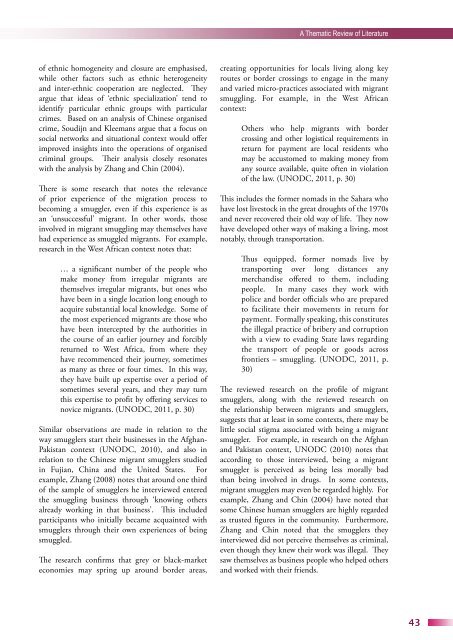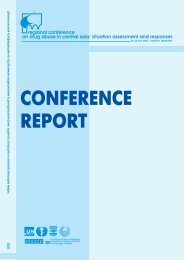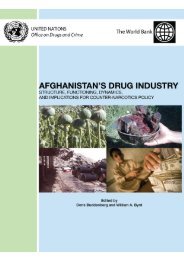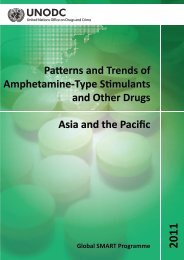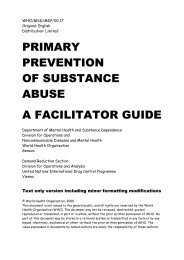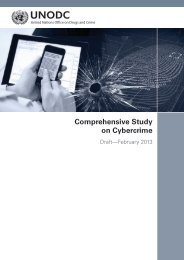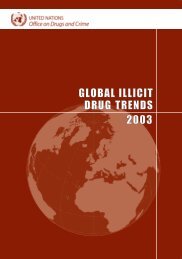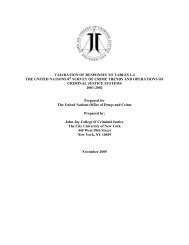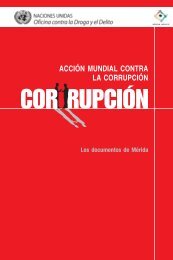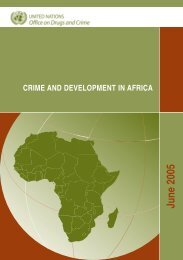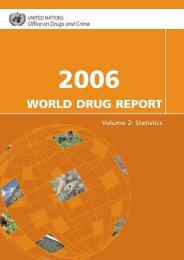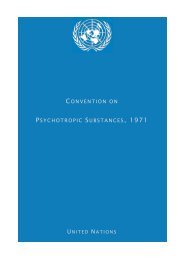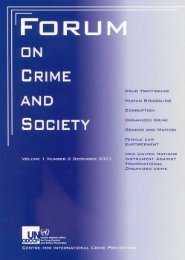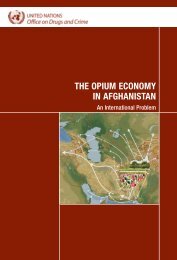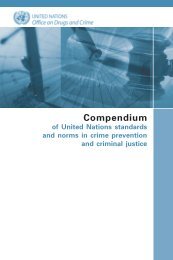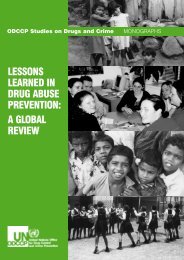Migrant Smuggling in Asia - United Nations Office on Drugs and Crime
Migrant Smuggling in Asia - United Nations Office on Drugs and Crime
Migrant Smuggling in Asia - United Nations Office on Drugs and Crime
Create successful ePaper yourself
Turn your PDF publications into a flip-book with our unique Google optimized e-Paper software.
of ethnic homogeneity <strong>and</strong> closure are emphasised,<br />
while other factors such as ethnic heterogeneity<br />
<strong>and</strong> <str<strong>on</strong>g>in</str<strong>on</strong>g>ter-ethnic cooperati<strong>on</strong> are neglected. �ey<br />
argue that ideas of ‘ethnic specializati<strong>on</strong>’ tend to<br />
identify particular ethnic groups with particular<br />
crimes. Based <strong>on</strong> an analysis of Ch<str<strong>on</strong>g>in</str<strong>on</strong>g>ese organised<br />
crime, Soudijn <strong>and</strong> Kleemans argue that a focus <strong>on</strong><br />
social networks <strong>and</strong> situati<strong>on</strong>al c<strong>on</strong>text would o�er<br />
improved <str<strong>on</strong>g>in</str<strong>on</strong>g>sights <str<strong>on</strong>g>in</str<strong>on</strong>g>to the operati<strong>on</strong>s of organised<br />
crim<str<strong>on</strong>g>in</str<strong>on</strong>g>al groups. �eir analysis closely res<strong>on</strong>ates<br />
with the analysis by Zhang <strong>and</strong> Ch<str<strong>on</strong>g>in</str<strong>on</strong>g> (2004).<br />
�ere is some research that notes the relevance<br />
of prior experience of the migrati<strong>on</strong> process to<br />
becom<str<strong>on</strong>g>in</str<strong>on</strong>g>g a smuggler, even if this experience is as<br />
an ‘unsuccessful’ migrant. In other words, those<br />
<str<strong>on</strong>g>in</str<strong>on</strong>g>volved <str<strong>on</strong>g>in</str<strong>on</strong>g> migrant smuggl<str<strong>on</strong>g>in</str<strong>on</strong>g>g may themselves have<br />
had experience as smuggled migrants. For example,<br />
research <str<strong>on</strong>g>in</str<strong>on</strong>g> the West African c<strong>on</strong>text notes that:<br />
… a signi�cant number of the people who<br />
make m<strong>on</strong>ey from irregular migrants are<br />
themselves irregular migrants, but <strong>on</strong>es who<br />
have been <str<strong>on</strong>g>in</str<strong>on</strong>g> a s<str<strong>on</strong>g>in</str<strong>on</strong>g>gle locati<strong>on</strong> l<strong>on</strong>g enough to<br />
acquire substantial local knowledge. Some of<br />
the most experienced migrants are those who<br />
have been <str<strong>on</strong>g>in</str<strong>on</strong>g>tercepted by the authorities <str<strong>on</strong>g>in</str<strong>on</strong>g><br />
the course of an earlier journey <strong>and</strong> forcibly<br />
returned to West Africa, from where they<br />
have recommenced their journey, sometimes<br />
as many as three or four times. In this way,<br />
they have built up expertise over a period of<br />
sometimes several years, <strong>and</strong> they may turn<br />
this expertise to pro�t by o�er<str<strong>on</strong>g>in</str<strong>on</strong>g>g services to<br />
novice migrants. (UNODC, 2011, p. 30)<br />
Similar observati<strong>on</strong>s are made <str<strong>on</strong>g>in</str<strong>on</strong>g> relati<strong>on</strong> to the<br />
way smugglers start their bus<str<strong>on</strong>g>in</str<strong>on</strong>g>esses <str<strong>on</strong>g>in</str<strong>on</strong>g> the Afghan-<br />
Pakistan c<strong>on</strong>text (UNODC, 2010), <strong>and</strong> also <str<strong>on</strong>g>in</str<strong>on</strong>g><br />
relati<strong>on</strong> to the Ch<str<strong>on</strong>g>in</str<strong>on</strong>g>ese migrant smugglers studied<br />
<str<strong>on</strong>g>in</str<strong>on</strong>g> Fujian, Ch<str<strong>on</strong>g>in</str<strong>on</strong>g>a <strong>and</strong> the <str<strong>on</strong>g>United</str<strong>on</strong>g> States. For<br />
example, Zhang (2008) notes that around <strong>on</strong>e third<br />
of the sample of smugglers he <str<strong>on</strong>g>in</str<strong>on</strong>g>terviewed entered<br />
the smuggl<str<strong>on</strong>g>in</str<strong>on</strong>g>g bus<str<strong>on</strong>g>in</str<strong>on</strong>g>ess through ‘know<str<strong>on</strong>g>in</str<strong>on</strong>g>g others<br />
already work<str<strong>on</strong>g>in</str<strong>on</strong>g>g <str<strong>on</strong>g>in</str<strong>on</strong>g> that bus<str<strong>on</strong>g>in</str<strong>on</strong>g>ess’. �is <str<strong>on</strong>g>in</str<strong>on</strong>g>cluded<br />
participants who <str<strong>on</strong>g>in</str<strong>on</strong>g>itially became acqua<str<strong>on</strong>g>in</str<strong>on</strong>g>ted with<br />
smugglers through their own experiences of be<str<strong>on</strong>g>in</str<strong>on</strong>g>g<br />
smuggled.<br />
�e research c<strong>on</strong>�rms that grey or black-market<br />
ec<strong>on</strong>omies may spr<str<strong>on</strong>g>in</str<strong>on</strong>g>g up around border areas,<br />
!#70'4&%*8#9':*';#$


